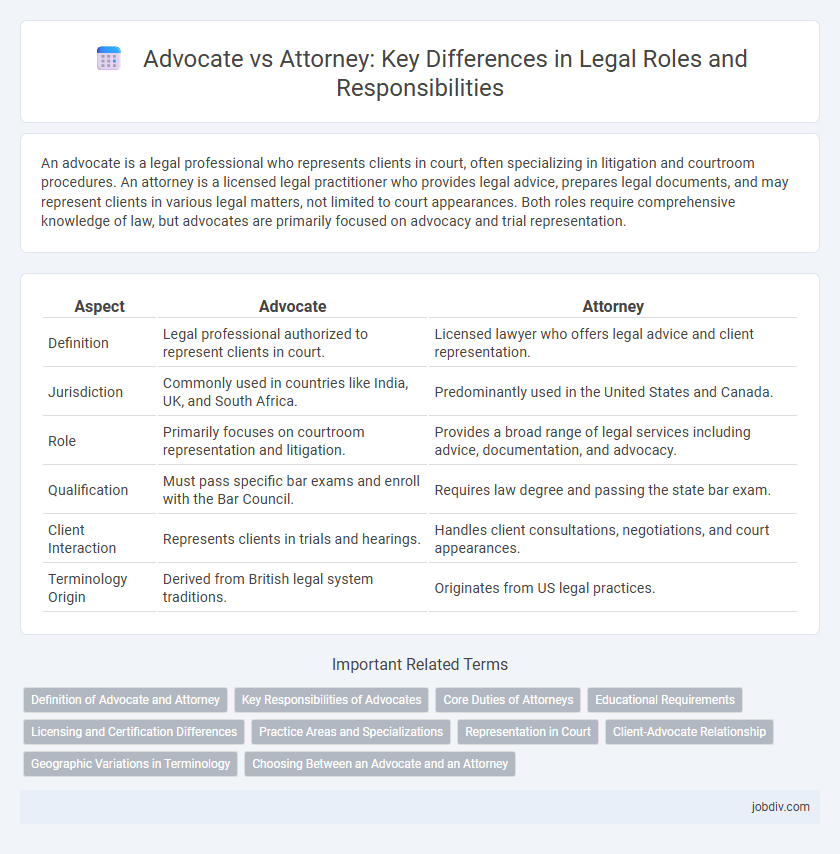An advocate is a legal professional who represents clients in court, often specializing in litigation and courtroom procedures. An attorney is a licensed legal practitioner who provides legal advice, prepares legal documents, and may represent clients in various legal matters, not limited to court appearances. Both roles require comprehensive knowledge of law, but advocates are primarily focused on advocacy and trial representation.
Table of Comparison
| Aspect | Advocate | Attorney |
|---|---|---|
| Definition | Legal professional authorized to represent clients in court. | Licensed lawyer who offers legal advice and client representation. |
| Jurisdiction | Commonly used in countries like India, UK, and South Africa. | Predominantly used in the United States and Canada. |
| Role | Primarily focuses on courtroom representation and litigation. | Provides a broad range of legal services including advice, documentation, and advocacy. |
| Qualification | Must pass specific bar exams and enroll with the Bar Council. | Requires law degree and passing the state bar exam. |
| Client Interaction | Represents clients in trials and hearings. | Handles client consultations, negotiations, and court appearances. |
| Terminology Origin | Derived from British legal system traditions. | Originates from US legal practices. |
Definition of Advocate and Attorney
An advocate is a legal professional who represents clients in court and provides expert advice on legal matters, primarily focusing on litigation and courtroom advocacy. An attorney is a licensed legal practitioner authorized to act on behalf of clients in legal matters, including providing counsel, drafting documents, and representing clients in and out of court. While both advocates and attorneys have legal training, advocates specialize in courtroom representation, whereas attorneys handle a broader range of legal services.
Key Responsibilities of Advocates
Advocates specialize in representing clients in court by presenting cases, cross-examining witnesses, and offering legal advice tailored to litigation strategy. They draft pleadings, prepare legal arguments, and negotiate settlements, ensuring clients' interests are vigorously defended during trials. Their expertise in courtroom procedures and evidence law positions them as essential figures in the judicial process.
Core Duties of Attorneys
Attorneys primarily provide legal advice, draft legal documents, and represent clients in both civil and criminal cases, ensuring adherence to legal standards and court procedures. They negotiate settlements, prepare cases for trial, and may appear in court to advocate for clients' interests. Their core duties also include conducting legal research, interpreting laws and precedents, and maintaining client confidentiality.
Educational Requirements
Advocates typically require a law degree followed by enrollment in a bar council or law society, depending on the jurisdiction, to practice in court. Attorneys often need to complete a law degree and pass a comprehensive bar examination, with some regions mandating additional legal training or internships. The educational pathways emphasize legal theory, practical skills, and professional ethics tailored to regional legal systems.
Licensing and Certification Differences
Advocates typically must pass a state bar examination and obtain a license to practice law, enabling them to represent clients in court. Attorneys often hold a law degree and may require additional certification or licensing depending on jurisdiction, allowing them to provide legal advice and handle various legal matters. Licensing requirements vary by country and state, with advocates focusing on courtroom representation while attorneys cover a broader range of legal services.
Practice Areas and Specializations
Advocates primarily focus on courtroom representation and litigation, specializing in trial advocacy, criminal law, civil disputes, and appellate practice. Attorneys offer broader legal services including drafting contracts, providing legal advice, and handling transactional matters, with specializations in corporate law, real estate, intellectual property, and estate planning. Specific practice areas often overlap, but advocates emphasize advocacy and courtroom skills while attorneys may engage in both advisory and representational roles across diverse legal fields.
Representation in Court
An advocate specializes in representing clients directly in court, presenting arguments and evidence before judges or juries. Attorneys provide broader legal services, including advising clients and preparing legal documents, but may not always appear in court personally unless they also act as advocates. The distinction varies by jurisdiction, with advocates primarily focused on courtroom advocacy while attorneys handle comprehensive legal needs.
Client-Advocate Relationship
The client-advocate relationship is foundational in legal representation, characterized by trust, confidentiality, and effective communication. Advocates often provide specialized legal advice and courtroom representation tailored to client needs, emphasizing personalized strategy and advocacy. Maintaining transparency and responsiveness ensures clients' rights are protected and legal objectives are met efficiently.
Geographic Variations in Terminology
The terms "advocate" and "attorney" vary geographically, with "advocate" commonly used in countries like India, South Africa, and Scotland to describe legal professionals who represent clients in court. In contrast, "attorney" is predominantly used in the United States to refer to licensed legal practitioners who can provide legal advice and representation. These variations reflect differences in legal systems and professional titles across jurisdictions.
Choosing Between an Advocate and an Attorney
Choosing between an advocate and an attorney depends on the jurisdiction and specific legal needs, as advocates primarily represent clients in higher courts while attorneys handle a broader scope of legal services including drafting documents and providing legal advice. In common law countries like India, an advocate holds the exclusive right to plead cases in courts, whereas an attorney may engage in transaction work or client consultations without courtroom advocacy. Assessing the nature of the legal issue, whether it requires courtroom representation or advisory services, helps determine the appropriate professional to engage.
Advocate vs Attorney Infographic

 jobdiv.com
jobdiv.com